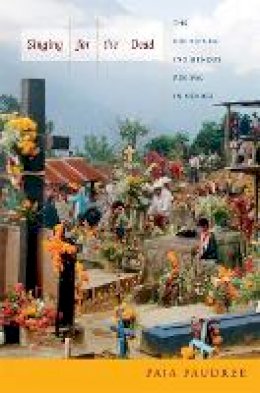
Stock image for illustration purposes only - book cover, edition or condition may vary.
Singing for the Dead: The Politics of Indigenous Revival in Mexico
Paja Faudree
€ 46.06
FREE Delivery in Ireland
Description for Singing for the Dead: The Politics of Indigenous Revival in Mexico
Paperback. Singing for the Dead chronicles how indigenous people from Oaxaca, Mexico's poorest state, have reversed decades of cultural and linguistic erosion by reviving and reinventing ethnic traditions, particularly by speaking and singing the local indigenous language. Num Pages: 328 pages, 23 photographs, 4 tables, 3 maps. BIC Classification: 1KLCM; JFSL9; JHMC. Category: (P) Professional & Vocational. Dimension: 236 x 157 x 20. Weight in Grams: 496.
Singing for the Dead chronicles ethnic revival in Oaxaca, Mexico, where new forms of singing and writing in the local Mazatec indigenous language are producing powerful, transformative political effects. Paja Faudree argues for the inclusion of singing as a necessary component in the polarized debates about indigenous orality and literacy, and she considers how the coupling of literacy and song has allowed people from the region to create texts of enduring social resonance. She examines how local young people are learning to read and write in Mazatec as a result of the region's new Day of the Dead song contest. Faudree also studies how tourist interest in local psychedelic mushrooms has led to their commodification, producing both opportunities and challenges for songwriters and others who represent Mazatec culture. She situates these revival movements within the contexts of Mexico and Latin America, as well as the broad, hemisphere-wide movement to create indigenous literatures. Singing for the Dead provides a new way to think about the politics of ethnicity, the success of social movements, and the limits of national belonging.
Product Details
Format
Paperback
Publication date
2013
Publisher
Duke University Press
Number of pages
328
Condition
New
Number of Pages
277
Place of Publication
North Carolina, United States
ISBN
9780822354314
SKU
V9780822354314
Shipping Time
Usually ships in 7 to 11 working days
Ref
99-1
About Paja Faudree
Paja Faudree is Assistant Professor of Anthropology at Brown University.
Reviews for Singing for the Dead: The Politics of Indigenous Revival in Mexico
“Paja Faudree’s ambitious new study of ethnic politics among Mazatec people combines a rich understanding of Oaxaca’s unique histories and a sophisticated knowledge of recent social theory...the author does a magnificent job of historicizing and ethnographically detailing the unique cultural revival occurring in the Mazatec region.” - Howard Campbell (The Americas) “A very well-written and important work on the anthropological linguistics of Mesoamerica. Essential.” - P. R. Sullivan (Choice) "A major contribution to the study of ethnic revival movements in the Americas and elsewhere." - Zoila Mendoza (Journal of the Royal Anthropological Institute) "This is a splendid book.” - Chris Goertzen (Western Folklore) “The questions Singing for the Dead raises are provocative and well timed. An ethnographically grounded and nuanced study, this elegant contribution to knowledge on indigenous literature and literacy in Mexico extends disciplinary walls to address much broader questions of ethnic identity, social movements, and national belonging.” - Alex E. Chávez (American Ethnologist) "Faudree’s book represents an important contribution to empirically founded discussions of the role of artistic practice in linguistic revitalization. In her rich portrait of grassroots initiatives in symbiotic relation with national ethnic demands, Faudree gives us reasons to feel hopeful about the future of indigenous literacy efforts in Mexico." - Genner Llanes-Ortiz (American Anthropologist) "Faudree’s text is a rich and detailed meditation on the revival movements in Sierra Mazateca in Oaxaca, Mexico.... Those who study revitalization movements, Mazateco culture and history, or Oaxaca will find much food for thought in Singing for the Dead." - Mintzi Auanda Martinez-Rivera (Journal of Folklore Research)
